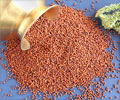Whole grains are packed with fiber and antioxidants. Consumption of whole grains helps reduce the risk of heart disease among middle- to older-aged adults.
- Whole grains help cut down the risk of cardiovascular disease
- Whole-grain consumption helps reduce bad cholesterol levels in the blood, and controls blood sugar and blood pressure levels
- The Dietary Guidelines for Americans 2020-2025 recommends three or more than three servings of whole grains
An estimated 32% of all deaths worldwide occur due to cardiovascular disease. In America alone, about 655,000 people die from heart disease each year.
Read More..
Dietary Assessment through a Large Cohort-Based Study
The current study was performed by researchers at the Jean Mayer USDA Human Nutrition Research Center on Aging at Tufts University. They sought to analyze the impact of grain intake (both whole grains and refined grains) on five critical factors that influence the risk of cardiovascular disease: changes in waist circumference (WC); fasting HDL cholesterol, triglyceride, and glucose concentrations; and blood pressure.For this, they used data of about 3,100 participants from the Framingham Heart Study Offspring Cohort that started a long back during the 1970s. Most of the participants were white, and they were in their mid-50s at the start of the study. Data collection for the study was solely based on the food frequency questionnaires, health, and lifestyle status of the subjects that were received approximately every four years from 1991 to 2014 resulting in a median 18-year follow-up.
Whole Grains Proved to be Heart-friendly
Based on the analyses of data, the team found that a higher intake of whole grains was associated with greater increases in good cholesterol levels and declines in the concentrations of unhealthy fats. In contrast, refined grains led to lower levels of reduction in unhealthy fats. People who had a large amount of whole grains in their diet also experienced smaller increases in waist circumference, fasting glucose concentration, and systolic blood pressure than those who had more refined grains.What do Whole Grains Have in Special?
"There are several reasons that whole grains may work to help people maintain waist size and reduce increases in the other risk factors. The presence of dietary fiber in whole grains can have a satiating effect, and magnesium, potassium, and antioxidants may contribute to lowering blood pressure. Soluble fiber in particular may have a beneficial effect on post-meal blood sugar spikes," said Caleigh Sawicki, a student at Gerald J. and Dorothy R. Friedman School of Nutrition Science and Policy at Tufts University.Although the study poses some limitations, including the potential bias that could occur due to the self-reported details from participants, McKeown highlighted, "The average American consumes about five servings of refined grains daily, much more than is recommended, so it's important to think about ways to replace refined grains with whole grains throughout your day."
Here's How You Can Make Your Plate With Whole Grains
- Start simple by making at least one meal a day with whole grains
- Cut down on breakfasts made with refined flours with whole-grain cereals
- Switch your pasta with whole-grain bread sandwiches
References:
- Eating whole grains linked to smaller increases in waist size, blood pressure, blood sugar - (https://www.eurekalert.org/pub_releases/2021-07/tuhs-ewg070721.php)
- Caleigh M Sawicki, Paul F Jacques, Alice H Lichtenstein, Gail T Rogers, Jiantao Ma, Edward Saltzman, Nicola M McKeown, Whole- and Refined-Grain Consumption and Longitudinal Changes in Cardiometabolic Risk Factors in the Framingham Offspring Cohort, The Journal of Nutrition, 2021; nxab177 - (https://doi.org/10.1093/jn/nxab177)
Source-Medindia
















